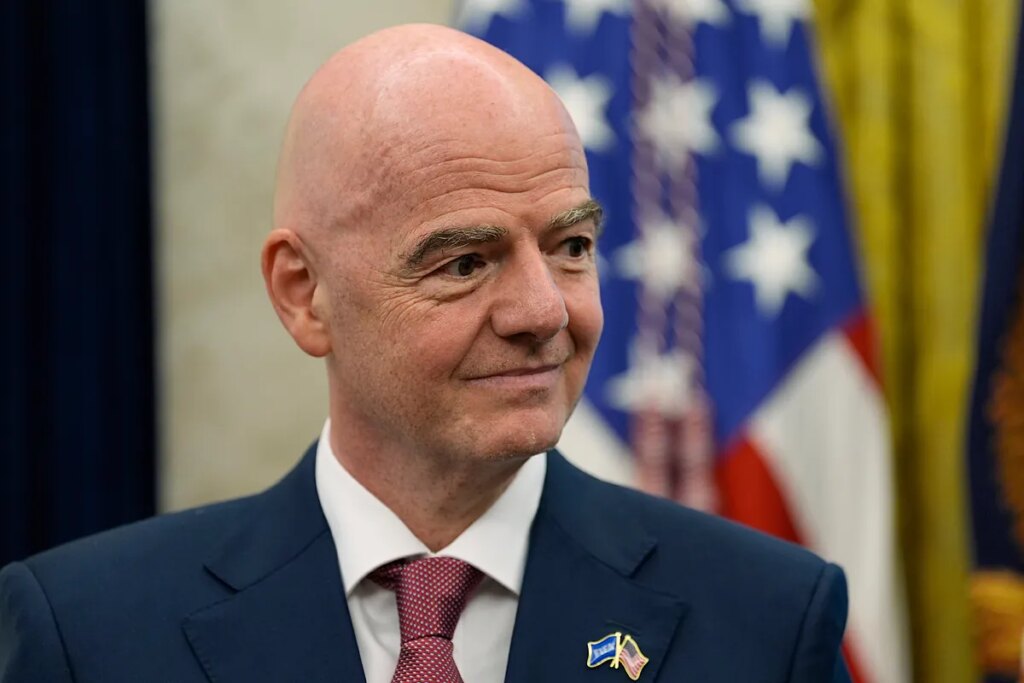FIFA President Gianni Infantino has boldly predicted that soccer has the potential to become the “No. 1 sport here in America,” marking it as a top priority for FIFA to help the game reach new heights in the United States and Major League Soccer (MLS).
However, before achieving that milestone, Infantino emphasized that American soccer should consider structural changes – including the introduction of promotion and relegation into MLS.
Infantino shared these insights during a candid fireside conversation with Fox Sports’ Jordan Schultz at the Fanatics Fest in New York City, just hours before heading to MetLife Stadium for a Club World Cup match.
Infantino confidently stated, “In three to four, maximum five years, it will be top, top, top. One of the top leagues in the world, for sure. And I can tell you why – because now I’m here.”
This prediction aligns with data from a recent 2025 S&P Global poll of 2,501 internet adults, which revealed that 14 percent of respondents watch soccer – placing the sport behind the traditional “big four” American sports (baseball, basketball, football, hockey), as well as the Winter and Summer Olympics.
Of those fans, 76 percent tune in to men’s international soccer, 50 percent follow women’s international matches, and 55 percent watch Major League Soccer (MLS). Attendance figures also show soccer as the fourth most-attended sport in the U.S. at eight percent of total sporting event attendees in 2024.
Exploring promotion and relegation in MLS
One of the main challenges Infantino identified for soccer in the U.S. is the “pay to play” youth soccer system, which he called “a problem here in America.” But beyond grassroots reforms, Infantino hinted at a more transformative idea: the adoption of promotion and relegation to increase excitement and competition.
When asked about the remarkable success story of Wrexham FC, a team that climbed three straight leagues and attracted attention through an FX series, Infantino highlighted the unique drama soccer offers through its tiered competition structure:
“This is one of the beauties of promotion and relegation,” he said. “So, in soccer, unlike any other sport, surprises are happening, and the little one can beat the big one, right? And this rarely, rarely happens in other sports, 90 percent of the time, the stronger one wins. In soccer, it’s 70 percent of the time.
“You have these surprises. You have these fairy tales of teams. … This is something you can bring in this American culture as well, where you don’t have the concept of promotion and relegation, and there’s something interesting that I think has to be explored.”
This kind of Cinderella story remains absent from the American men’s soccer scene due to the lack of promotion and relegation, a feature ingrained in most soccer leagues worldwide.
MLS and the future of U.S. Soccer
Though the idea seems ambitious, there are signs that change is underway. In March, the owners of the United Soccer League (USL) voted to implement promotion and relegation within their leagues – a move that challenges the traditional closed structure of MLS. Since its inception in 1996, MLS has operated as a single-entity league with no promotion or relegation, a model designed to ensure financial stability and parity among teams.
This format was established partly as a condition of the U.S. hosting the 1994 men’s World Cup, which required a sustainable top-tier league. Unlike the North American Soccer League (NASL) of the 1970s and ’80s, which failed due to financial instability and also did not use relegation, MLS limits team spending and enforces strict roster regulations to maintain competitive balance.
Few leagues globally match MLS’s tight controls on expenditures, which restrict teams from simply outspending competitors to gain an advantage. Clubs focus resources on a few key players, navigating a complex system of salary caps and roster rules designed to keep the league competitive.
Infantino’s vision signals a willingness to revisit these long-standing policies. “We have to be mindful of the American sports culture,” he said, but also sees “something interesting” in exploring promotion and relegation to ignite more excitement and opportunity for growth.
If implemented, this system could dramatically change how professional soccer operates in the United States, creating pathways for underdog teams to rise and increasing the stakes for all involved – potentially helping soccer finally claim the top spot in American sports.
Read the full article here

